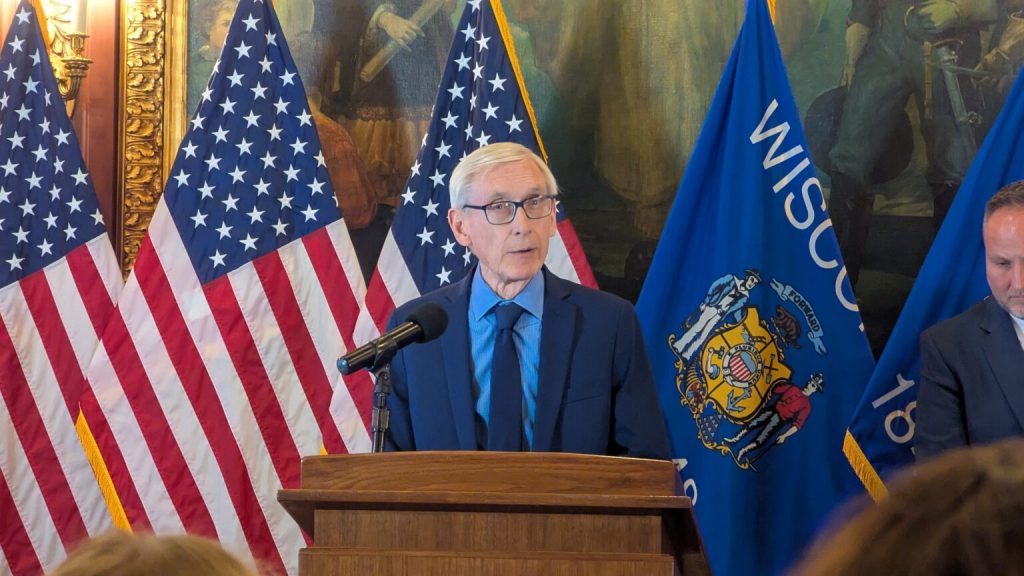Governor Signs School Cell Phone Ban, Several Other Laws
Evers' signature advances policies to tackle reckless driving, allow candidates off ballots.
Gov. Tony Evers signed a bill Friday that will limit cell phones in schools, making Wisconsin the 36th state in the nation to do so, and a bill that will make it easier for candidates for office to remove themselves from ballots.
A Wisconsin Policy Forum report from May found that most school districts already restrict student cellphone usage to common areas, though policies vary widely across the state.
Under the new law, 2025 Wisconsin Act 42, school districts will have until July 2026 to implement a policy that bans cellphones during instructional times. The policy will need to include exceptions for emergencies, for educational purposes and cases involving student health care, individualized education plans (IEPs) or 504 plans (learning environment accommodations).
Evers said in a statement that the decision about whether to sign the bill weighed heavily on him, especially given his belief that “decisions like this should be made at the local level by local school districts”. However, he said he is “deeply concerned” about how cell phone and social media use are affecting students, including their mental health, school outcomes and social skills.
“Our kids are struggling today, perhaps now more than ever. It’s really tough to be a kid these days, and we know that cellphones can be a major distraction from learning, a source of bullying, and a barrier to our kids’ important work of just being a kid,” Evers said in a statement. “While I wish the Legislature would have taken a different approach with this legislation, I will never stop fighting for Wisconsin’s kids and working to do what’s best for them, which is why I am signing this bill into law today.”
Evers also pointed to widespread support for cellphone ban policies in his statement.
Pew Research recently found that 74% of U.S. adults support banning middle and high school students from using cellphones during class — an increase from 68% last fall. A Marquette Law School poll found that 89% of voters support banning cellphones during class periods.
Evers also takes action on 19 other bills
Evers also signed Assembly Bill 35, now 2025 Wisconsin Act 43, to make it easier for candidates to withdraw themselves from a ballot.
Under the law, candidates for office in Wisconsin will be able to withdraw their candidacy in a general or primary election and not be included on the ballot if they file a sworn statement.
The change to Wisconsin law was proposed after Robert F. Kennedy Jr. was not allowed to remove himself from the presidential ballot in 2024 after he dropped out and endorsed President Donald Trump. State law then said that candidates could only have their names removed if they were dead.
The new law will allow candidates to remove themselves, but they’ll be responsible for paying the Wisconsin Elections Commission a $1,000 fee. Non-statewide candidates will need to pay $250.
Under the law, a person could face a Class G felony with a maximum penalty of up to $25,000 and imprisonment for up to 10 years if they intentionally filed a false statement withdrawing a person’s candidacy.
Evers also signed Senate Bill 309, now 2025 Wisconsin Act 41, which clarifies statute to say that 911 call centers and dispatchers who transfer a caller to the national 988 Suicide & Crisis Lifeline are generally immune from civil liability for any outcomes resulting from the transfer.
“Our 911 dispatchers play a vital role in the safety and security of our state, but they often don’t have the time or resources available to provide the response necessary for somebody experiencing a mental health crisis,” Evers said. “By offering much-needed protection to 911 dispatchers who transfer calls to the 988 Lifeline, this bill allows for a better and safer crisis response by ensuring crisis calls go to the service providers who are trained to provide appropriate care and resources to those who need it most.”
The law specifies that the immunity doesn’t apply if an injury is the result of an act or omission that constitutes gross negligence or willful misconduct by the dispatcher.
Another bill signed by Evers, now 2025 Wisconsin Act 46, seeks to address the reckless driving issue in Wisconsin by allowing local governments to implement ordinances that will allow officers to immediately impound a vehicle used to drive recklessly and retain the vehicle until all outstanding fees, fines and forfeitures are paid.
Evers said in a statement that the law will “hold bad actors accountable” and help keep roads and communities safe.
“Whether it’s distracted driving, speeding, or erratic and aggressive behaviors, reckless driving puts our kids, families, and communities in harm’s way,” Evers said. “Tackling reckless driving has been a bipartisan goal in recent years, and I’m glad to see this trend has continued this session.”
Evers also vetoed several bills.
- AB 5, which would have required school districts respond to material inspections requests within 14 days
- AB 39, which would have required state employees to work in person for 80% of their week,
- A handful of bills — AB 162, AB 168 and AB 169 — that would have made changes to unemployment and workforce development programs.
- SB 25, which would have prohibited a court from allowing a complaint to be filed in a John Doe proceeding against a police officer who is involved in a shooting if the district attorney determines there is no basis to prosecute the officer.
- SB 184, which would have barred local governments from implementing restrictions on a cars and vehicles based on its energy source
The full list of bills upon which Evers took action can be found here.
Evers signs bills to restrict cell phone use in schools, let candidates off ballots was originally published by the Wisconsin Examiner.
If you think stories like this are important, become a member of Urban Milwaukee and help support real, independent journalism. Plus you get some cool added benefits.






















Sad that we have to have a law for common sense. Parents, school boards, teachers . . . should have solved this problem a long time ago.
Do we need a law requiring students to read books? What about teaching students to add, multiply, and so on?
Do we need to change teacher education? Perhaps all teachers should have to pass a College Algebra course.